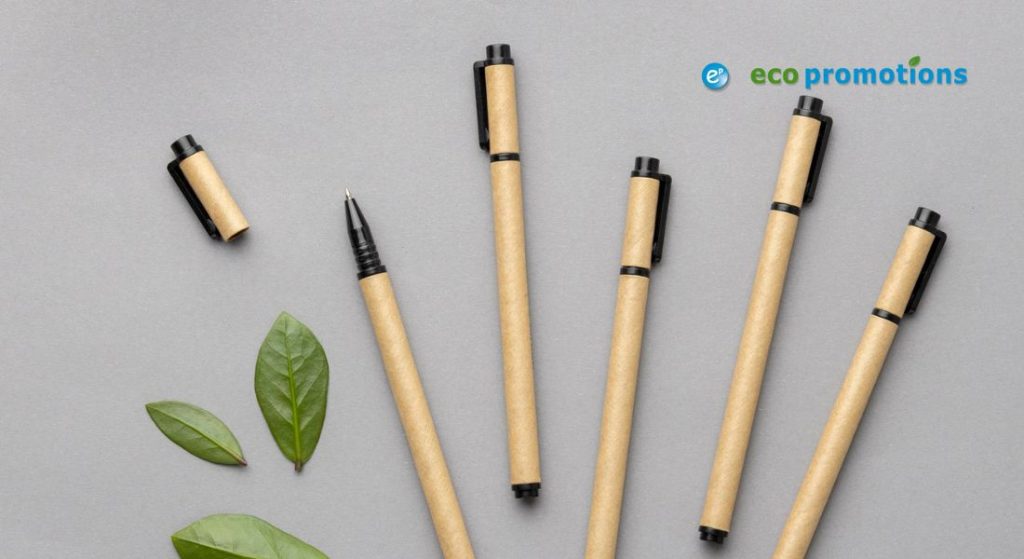Each year, billions of plastic pens are discarded, contributing significantly to global plastic pollution. Over 1.6 billion disposable pens end up in landfills annually, taking centuries to decompose. This growing environmental issue has led consumers and businesses to seek sustainable alternatives, one of the most effective being wooden pens.
Not only are wooden pens biodegradable and made from renewable materials, but they also serve as elegant and eco-conscious promotional products. Companies looking to align their brand with sustainability can benefit from switching to wooden pens, reducing waste while offering a high-quality, long-lasting writing tool.
The Environmental Impact of Plastic Pens
Plastic pens may seem small, but their environmental footprint is significant. These mass-produced items rely on petroleum-based plastics, which are non-biodegradable and contribute to land and ocean pollution. Most disposable pens are used for a short time before being discarded, adding to the world’s plastic waste crisis.
The manufacturing process of plastic pens also generates high carbon emissions, consuming fossil fuels and releasing harmful chemicals into the environment. Because plastic pens are difficult to recycle due to their mixed materials (plastic, metal, and ink), they often end up in landfills or incinerators, further polluting the air and soil.
Switching to wooden pens is a practical way to address these environmental issues, reduce reliance on plastics, and promote more sustainable consumption habits.
How Wooden Pens Reduce Environmental Harm?
Unlike plastic pens, wooden pens are made from renewable resources such as bamboo, walnut, maple, or reclaimed wood. These materials are biodegradable, ensuring they break down naturally without leaving behind harmful microplastics.
Many manufacturers source wood responsibly through sustainable forestry practices, meaning that for every tree used, another is planted. Additionally, the production of wooden pens requires significantly less energy and fewer chemicals, lowering carbon emissions compared to plastic pen manufacturing.
Many wooden pens come with refillable ink cartridges to extend their lifespan further, reducing the need for frequent replacements. This makes them an eco-friendly and cost-effective choice for individuals and businesses alike.
What Are the Benefits of Using Wooden Pens?
Choosing wooden pens over plastic alternatives comes with several advantages:
1. Eco-Friendly & Biodegradable
Unlike plastic pens that take centuries to decompose, wooden pens are made from natural materials that break down quickly, reducing landfill waste.
2. Unique Aesthetic & Craftsmanship
Each wooden pen is one-of-a-kind, featuring distinctive grain patterns that add an elegant and sophisticated touch to writing.
3. Durability & Longevity
Well-crafted wooden pens are often sturdier than their plastic counterparts, making them a long-lasting investment.
4. Comfortable Grip & Writing Experience
The natural texture of wood provides a more comfortable and ergonomic grip, reducing hand fatigue during extended writing sessions.
5. Refillable & Sustainable
Many wooden pens come with refillable ink cartridges, eliminating the need for constant disposal and promoting sustainability.
6. Ideal for Promotional Products
Businesses can use branded wooden pens as eco-friendly promotional products, reinforcing their commitment to sustainability while offering a premium writing instrument.
What Are the Most Environmentally Friendly Pens?
The most eco-friendly pens are crafted from sustainable materials and built for long-lasting use. Here are some top options:
1. Wooden Pens
Made from bamboo, maple, or recycled wood, these pens decompose naturally and often come with refillable ink cartridges, reducing waste.
2. Recycled Paper Pens
Recycled paper pens are an eco-conscious writing solution, designed with barrels made from post-consumer recycled paper. These pens help reduce the need for virgin plastic or wood while offering the same reliable performance you’d expect from traditional pens. Ideal for schools, offices, and promotional giveaways, recycled paper pens support sustainability without compromising on quality.
3. Biodegradable Cornstarch Pens
Cornstarch pens made from cornstarch-based plastics decompose faster than traditional plastic pens, making them a more sustainable option.
4. Refillable Metal Pens
Though not biodegradable, stainless steel or aluminum pens last for years, preventing disposable waste and reducing overall consumption.
5. Bamboo Pens
Bamboo grows quickly and regenerates naturally without pesticides or fertilisers, making bamboo pens a highly sustainable writing option.
Looking to Bulk Buy Bamboo Pens? Contact us today.
Wooden Pens as Sustainable Promotional Products
As businesses shift toward eco-friendly branding, wooden pens have emerged as an excellent choice for sustainable promotional products. Unlike plastic pens that are often discarded after minimal use, wooden pens are durable, aesthetically pleasing, and environmentally responsible.
Companies can personalise wooden pens with laser engraving or eco-friendly ink printing, creating a high-quality, long-lasting promotional item. Whether for corporate gifts, trade shows, or employee appreciation, these pens showcase a company’s dedication to sustainability while offering a functional product.
With more consumers supporting environmentally responsible brands, switching to wooden pens for promotional purposes enhances brand image and contributes to reducing plastic waste.
Conclusion
Replacing plastic pens with wooden pens is an easy yet effective step toward minimising plastic waste and supporting sustainability. These pens are biodegradable, refillable, and crafted from renewable materials, making them a superior alternative for both individuals and businesses.
For companies looking to enhance their eco-conscious branding, wooden pens serve as ideal promotional products, aligning with sustainable values while offering a premium writing experience. As the world embraces greener choices, investing in wooden pens is a small but meaningful step toward a cleaner planet.








